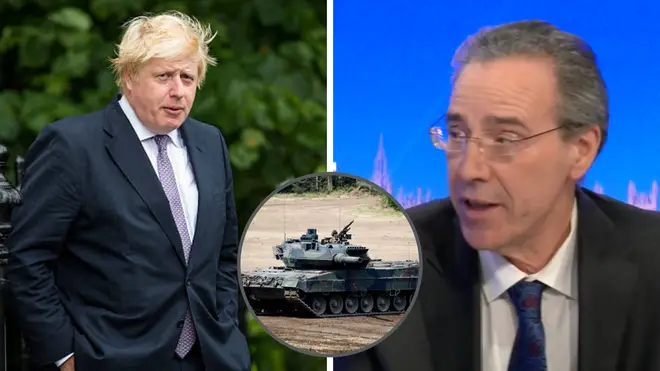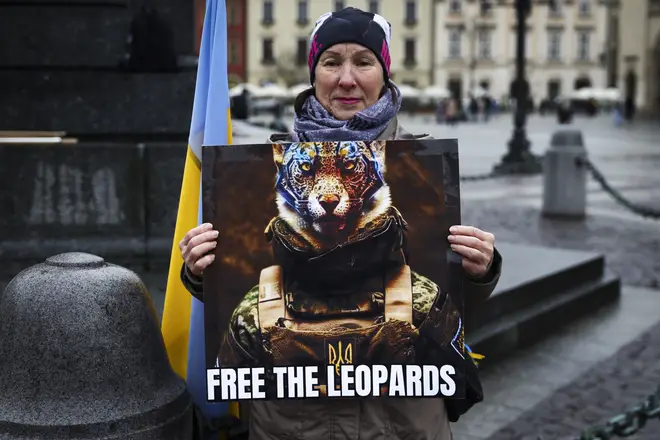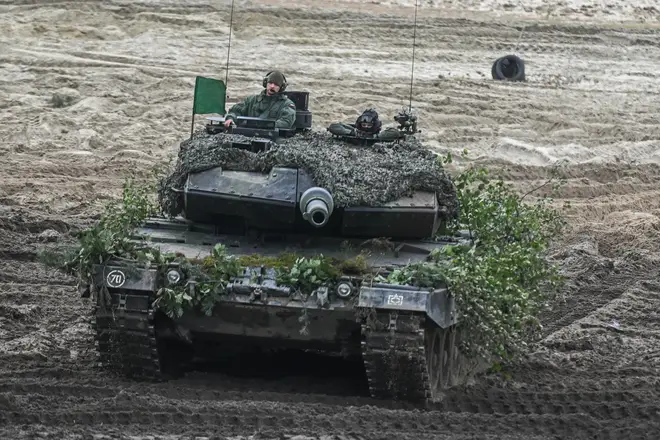
Ben Kentish 10pm - 1am
25 January 2023, 18:10 | Updated: 25 January 2023, 18:31

Boris Johnson did not sway the German government's decision to send tanks to Ukraine in its fight against Russia, the country's ambassador to the UK has said.
Former Prime Minister Mr Johnson called on Berlin to send tanks to Ukraine after a recent visit to Kyiv, where he is popular in because of his staunch support of defence efforts.
Germany said on Wednesday that it would send 14 Leopard tanks to Ukraine and gave permission for 14 allies to send theirs too, striking a blow in favour of Kyiv as it continues to battle Russia's invasion.

Ukrainian Ambassador Vadym Prystaiko says Germany's tanks will enable Ukraine to 'clear up the land'
The decision came after initial hesitation from Germany to send German-made vehicles to Ukraine following concerns it could escalate the conflict with Russia.
Asked by LBC's Andrew Marr on Wednesday whether Mr Johnson had any influence on Berlin's decision, German ambassador Miguel Berger said that "nothing could be further away from reality."

"No, I don't think so. It had to do really with the question of forming this coalition [between Western countries supporting Ukraine by sending tanks].
"It was not an easy decision because of the implications. But we have all seen how positively Ukraine was able to use Western armament.
Watch Tonight with Andrew Marr exclusively on Global Player every Monday to Thursday from 6pm to 7pm
"And we have also seen that there is no intention on the Russian side by Putin to look for a negotiated outcome. On the contrary, he is willing to continue with his war of aggression with destroying the Ukrainian state.
"And I think all of that together, led to the decision to form this coalition."

Mr Johnson had previously rubbished such "implications", adding that sending the tanks would accelerate Kyiv’s "inevitable" victory.
Writing in the Daily Mail, Mr Johnson had said: "They can, and will, drive Putin out of the whole of Ukraine. This is now a war of independence, and history teaches us that wars of independence only end one way. The question is when."
Ukrainian ambassador Vadim Prystaiko told Andrew the move was a "game-changer" because it could allow the Ukrainian army to push the Russians back to the border. "This qualitative change will allow us to bring the war to a totally different level," he said.
You can also listen to the podcast Tonight with Andrew Marr only on Global Player.
He added: "This is quality changes. Numbers are important. As you mentioned, we hope to receive hundreds of them... but the quality, that's what's interesting."
Russia branded Germany's move to send tanks to Ukraine a "blatant provocation" and issued a chilling warning that the new kit will "burn like all the rest". Mr Berger said that not every statement from Russia should be taken seriously, adding that "we expected some fury to come from Moscow".

Lieutenant General David Leakey calls James O'Brien to give an insight on tanks
The US followed Germany's lead, announcing on Wednesday that it would send 31 Abrams tanks to Ukraine, reversing previous claims that they are unsuitable for use in war with Russia. The UK has already said it will send Challenger 2 tanks to Ukraine.
Meanwhile Rishi Sunak held a call with Joe Biden, Emmanuel Macron, and German chancellor Olaf Scholz and Italian Prime Minister Giorgia Meloni on Wednesday afternoon to discuss sending tanks to Ukraine.
A Downing Street spokeswoman said that the PM "welcomed the decisions by allies to announce major battle tank contributions".
“This decisive, collective action would be a catalyst for other countries to follow suit," she added.
“The Prime Minister said it was now clear Russia was on the backfoot, and there was a window for international partners to accelerate efforts to secure lasting peace for Ukraine.
“He called on allies to intensify their support in the coming weeks and months.
“All the leaders welcomed the strong coordination of military supplies and reflected on the collective international action across the spectrum in support of Ukraine.
“They also welcomed the continued humanitarian and economic support for Ukraine in the wake of ongoing indiscriminate and barbaric Russian attacks on civilian infrastructure."